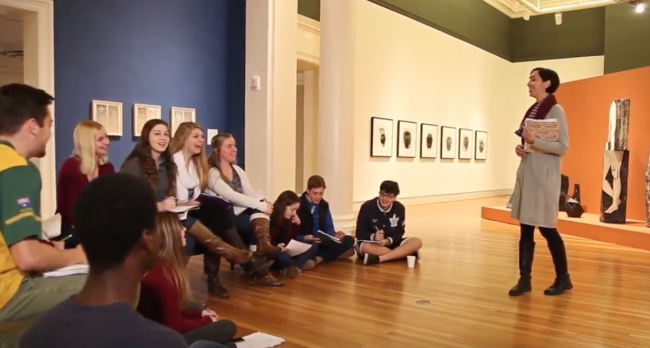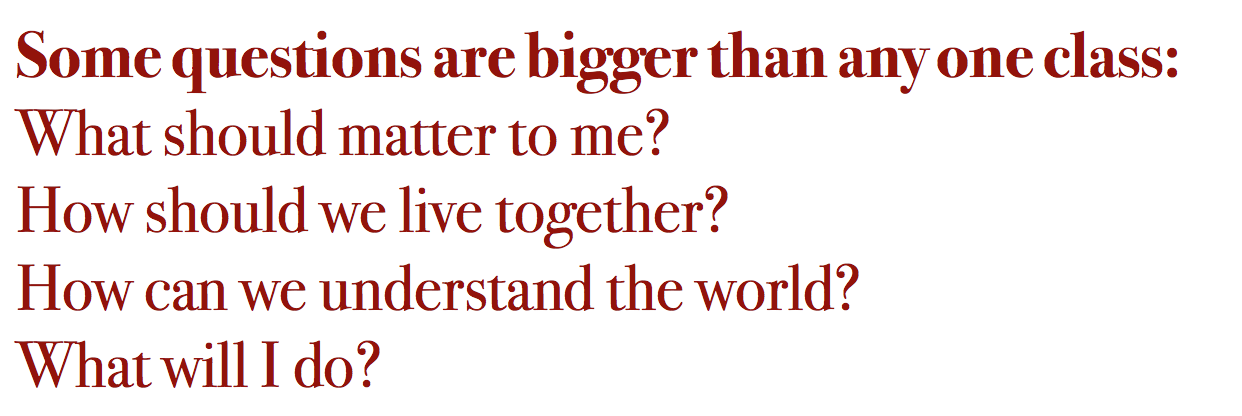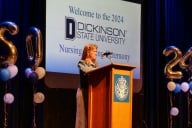You have /5 articles left.
Sign up for a free account or log in.

A Common Intellectual Experience class at Ursinus College
Ursinus College
Ursinus College’s Common Intellectual Experience has long been one of its crown jewels. So when it came time to rethink Ursinus’s core curriculum, it seemed natural to draw inspiration from the yearlong sequence, which asks freshmen to ponder some of life’s biggest questions with readings that stretch from Plato and Sappho to Ta-Nehisi Coates and Alison Bechdel.
The result of Ursinus’s years-long core revision is a curriculum based on four questions, to be asked throughout one’s time on campus, in the classroom and elsewhere: What should matter to me? How should we live together? How can we understand the world? And what will I do?
Basing a curriculum on four enduring questions may seem innovative, and in many ways it is. But it’s also a doubling down on what Ursinus already thinks it -- and liberal arts colleges generally -- does best.
“One way of looking at this is, it’s less about content than it is about transformative personal experience,” said Mark Schneider, vice president of academic affairs and dean. “I see so much potential here to capitalize on the residential liberal education experience in ways that we haven’t done before.”

Source: Ursinus
Ursinus’s Open Questions Core, adopted this year for incoming students, seeks to improve on a previous core by being a fundamentally iterative process. The idea is that everyone on campus knows these four questions, reflects on them often and takes note of their evolving answers.
Beyond that, the new core has a linked inquiry requirement to promote team-taught or paired courses that emphasize interdisciplinary learning communities. There is also a core capstone requirement, among other features.
The core starts with the two-semester Common Intellectual Experience, which for two decades has asked Ursinus freshmen to consider versions of the questions that now undergird the entire curriculum.
“At a certain point, we thought, ‘Why don’t we take the principles of the first-year course, specifically the question-based approach?’” said Paul Stern, a professor of politics who helped revise the curriculum. “So now the entire core is oriented on what we think are four essential human questions.”
He added, “These are genuine questions. We don’t think it’s our job to prescribe the answers and we don’t necessarily have the answers -- if we did, we could hand them out on the first day of class and save everyone a lot of effort.”
The Common Intellectual Experience, which is limited to 16-student sections that sometimes meet together as a class, still introduces students to all these questions via a shared curriculum that is built by faculty consensus. But its signature question is now, “What should matter to me?”
Students hopefully gain self-knowledge, to help them develop, in Ursinus’s words, “a considered, independent and responsible life.” Critical reading and writing, making arguments and discussion skills are emphasized.
Requiring students to look outward, to questions of community, large and small, Ursinus also requires that students take three courses addressing the question “How should we live together?” These courses must satisfy the following learning goals: engaging diversity and inequality, examining global interconnections, and considering related “obligations.” No more than two classes can be taken within a student’s major.
“How can we understand the world?” is addressed, part, by the linked inquiry requirement. Students generally must also take one course that satisfies each “Ways of Asking” requirement -- similar to distribution requirements elsewhere. These are humanistic inquiry, deductive reasoning, quantitative reasoning, social scientific inquiry, scientific or experimental inquiry, and art or performance.
A two-course sequence in the same foreign language also is required.
Students return to more individualistic inquiry via the final question, “What will I do?” An experiential learning project, including a post-project reflection, and a core capstone are required here. Core capstone courses are designated as such, and Ursinus sees much room for experimentation and innovation.
Schneider, a physicist, co-taught a pilot capstone last year with a colleague, focusing on health care in the U.S. Schneider recalled that one group of seniors decided to pitch a multicultural education requirement for health-care providers in Maryland, one group member’s home state.
“This is an opportunity to draw on all of these diverse experiences, so you’re really making sense of everything you have learned,” Schneider said of the capstone. The group aspect also is key, he said, as students gain experience in project management and consensus building with peers from different departments. Ideally, these capstones will have some real-world application.
Asked how many credits the core takes up, Schneider said there’s no exact number: students may double-count courses to fulfill various requirements. But most students will spend about one-quarter to one-third of their total credits prior to graduation explicitly working within the core, he said, underscoring the Ursinus’s goal that students will be asked to consider all four questions beyond the core, as well. Faculty members within students’ majors, along with academic and career advisers, staff, peers, and extracurriculars all may play a role, he said.
“This is going to be our biggest challenge -- how do we enforce that in a way that is meaningful, as opposed to just window dressing?” Schneider said.
Stern suggested that much will come down to communication. “Something we’re obligated to do as a liberal arts college is actually have the faculty say what we think a liberally educated person should learn and think about while they’re here. And we need to explain that first of all to ourselves, and then to students and prospective students. What is the driving impulse? Why do I have to do that?"
He added, "If we want students to be reflective about their education, we ought to have some very good explanation as to why we’re doing this.”
Jonathan Marks, chair of politics, who was not directly involved in revising the core, and who described himself as a curricular revision “skeptic,” said there’s evidence to believe that the approach is working as envisioned at Ursinus. This semester, for example, Marks said he was working to publicize an event on free speech and hate speech and was told by a student affairs staff member “that I’d have an easier time if I could explain how the event related to at least one of our four questions.”
Marks also said he now sees that the core communicates the institution’s “Socratic mission,” in that it “puts fundamental questions -- what should matter to me, how should we live together, how can we understand the world, and what will I do? -- at the center” of everything.
While Ursinus says its questions aren’t a direct response to the current political moment, Marks suggested that they do speak to the current discourse in terms of what ails it: it’s “not that people lack reasoning skills,” since they’re “often quite good at poking holes in other people’s arguments.” Rather, he said, “not many of them have experience or take pleasure in pursuing the kinds of questions about which reasonable people disagree, in trying to follow arguments where they lead and in shaping what they think and do on that basis.”
Without that kind of experience -- which the core facilitates -- disagreement is often avoided, he said, by finding a “way not to listen” or overpowering or “shutting up” one’s opponents.
Asked what he thought colleges should prioritize in curricular reform, Marks hesitated to generalize. But he ventured that colleges and universities would “do well to build on their existing missions,” as is the case at Ursinus.
While rolling out a new curriculum, sooner rather than later, seems to be part of a “consulting playbook,” he said, the new core was born of a real desire that the “spirit” of the Common Intellectual Experience “inhabit the rest of the college. We don’t think that we’re likely to do better in this environment by panicking and changing course.”
That doesn’t preclude a hope that students love the core and enroll in “droves,” however, Marks added.
In a challenging time for many small, private colleges, Stern said, “the best thing we can be is exactly what we are. We were set up to provide exactly this kind of education, as a residential college that asks students to think about how to lead the best life.”
Louise Woodstock, chair of media and communication studies, said that the Common Intellectual Experience “reflects the view that a liberal arts education should be about open-ended exploration of challenging ideas and questions.” And the Open Questions Core extends that “focus on inquiry into the curriculum in a holistic way.”
Woodstock noted that research indicates that metacognitive skills, or students’ ability to understand their own learning process, are “a powerful determinant of academic success.” And the core “fuses” an emphasis on metacognition with the liberal arts tradition, she said.
Roosevelt Montás, director of the Center for the Core Curriculum at Columbia University, has previously praised Ursinus’s Common Intellectual Experience. He said recently that organizing a curriculum around the experience “forces faculty to think outside of their own specialization and fields of interest, and to consider the broader aims of an undergraduate education.”









